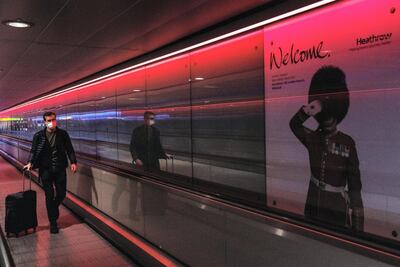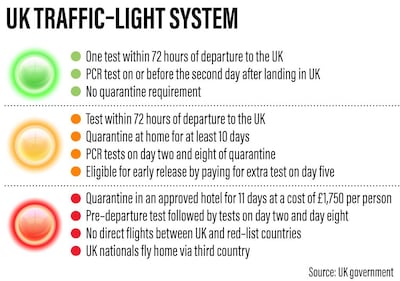UK government ministers are being accused of wasting the benefits of Britain's successful vaccination drive after changes to the traffic light system failed to win the support of the travel industry.
The government on Thursday announced 14 countries and territories – including Malta, Spain’s Balearic islands and some Caribbean destinations – would be opened up for quarantine-free travel.
All but one – Malta – were added to the green watch list, meaning they are at risk of being given amber status.
Eritrea, Haiti, Dominican Republic, Mongolia, Tunisia and Uganda were added to the red list.
Ministers also said quarantine-free travel would be allowed for fully vaccinated travellers but they set no firm date for this to happen, saying only it would happen “later in the summer”.
Transport Secretary Grant Shapps said on Friday further details about plans for vaccinated passengers would be announced next month.
He mentioned several hurdles, including how to verify foreign vaccine certificates.
"What do you do for people from elsewhere, where perhaps they don't have electronic records at all?" he told BBC's Radio 4 Today programme.
"The US is a good example, there are probably 50 different systems in different states and many of them are paper based. There are lots of things to work through."
He said the plans could discriminate against people who cannot be vaccinated against coronavirus for health reasons.
"We’ve also got some people who will never be vaccinated. There are obviously issues over how you treat those people fairly," he said.
Several key destinations including France, Greece, Italy and mainland Spain remain off limits to UK travellers.
German Chancellor Angela Merkel added to the uncertainty on Thursday by calling on other European nations to impose quarantine on British travellers as a result of the spread of the Delta variant of coronavirus.
Ms Merkel’s call for an EU-wide quarantine was firmly rejected by Spain, which is heavily reliant on British tourists, after its islands were added to UK’s green list.
Spain insisted that each EU country should make its own decisions about who to admit.
However, British visitors may face new restrictions after Francina Armengol, the head of the Balearics’ government, demanded “strict and safe entry controls” and officials called for proof of vaccination or diagnostic tests.
Despite being the only country sitting solely on the green list, Malta said anyone arriving from the UK needs to provide a vaccine certificate or go into quarantine at their own expense. The usual period is 14 days.
Prime Minister Boris Johnson did not respond to Ms Merkel's concerns, instead suggesting there was a "real opportunity" to open up travel for fully vaccinated passengers.

However, leading figures in the travel industry expressed dismay and frustration over the government’s plans.
They said more countries with low infection rates should have been included and suggested that the government's plans for vaccinated travellers were too vague.
British Airways chief executive Sean Doyle said the government was wasting the benefits of vaccines.
“We cannot afford another missed summer," he said.
"There are jobs at stake, Britons separated from family members, and we cannot afford to allow the success of our vaccine programme to be wasted."
EasyJet said the reopening fell short of a safe and sustainable easing of restrictions promised by the government.
"The science shows that travel to many European countries would have very little impact on hospitalisation and this is even more the case now given that Covid cases in Europe have declined," EasyJet boss Johan Lundgren said.
The Airport Operators Association’s chief executive Karen Dee said the government’s “overly cautious” approach would continue to have major financial effects on the sector.
“Any extension of the green list is welcome, however small, but we also have to be realistic: this is not yet the meaningful restart the aviation industry needs to be able to recover from the pandemic,” she said.
Confederation of British Industry chief UK policy director Matthew Fell said the green list "won't be enough to salvage the summer season" for the travel sector.
“International connectivity extends far beyond tourism and underpins our whole economy. The UK’s successful vaccine rollout means we should be in the vanguard of safely restarting international travel,” he said.
Henry Smith MP, Conservative chairman of the all-party Future of Aviation Group, said "what the travel and tourism sector needs is certainty".
"Putting them on an amber light or uncertain green won’t provide that,” he said.
“I welcome the direction of travel that sees greater, safer reopening but the list of green countries is overly cautious and the cost and complexity of testing is still a discouraging factor for people being able to travel.”
Mr Shapps said the government would continue to take a cautious approach to reopening foreign travel.
He said the intention was to introduce the changes for vaccinated holidaymakers "later in the summer".
But he said details of the scheme and when it would be introduced would not be announced until next month.
“We’re moving forward with efforts to safely reopen international travel this summer, and thanks to the success of our vaccination programme, we’re now able to consider removing the quarantine period for fully vaccinated UK arrivals from amber countries – showing a real sign of progress,” he said.
“It’s right that we continue with this cautious approach, to protect public health and the vaccine rollout as our top priority, while ensuring that our route out of the international travel restrictions is sustainable.”









